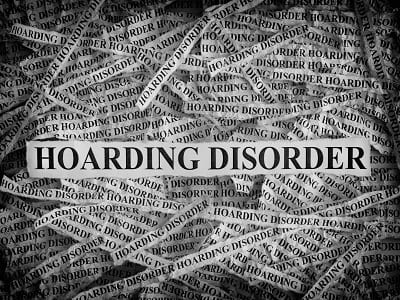Hoarding disorder is characterized by extreme difficulty experienced when parting with possessions, often accompanied by the persistent acquisition of additional items. Hoarded objects often have little or no value and can include old magazines, junk mail, books, clothes, and broken or non-functioning items. Those with hoarding disorder become severely distressed at the thought of discarding any personal possessions.
Hoarding was once considered a symptom of obsessive-compulsive disorder but is now a distinct diagnosis according to the most recent edition of the Diagnostic and Statistical Manual of Mental Disorders (DSM-5). The disorder is currently ranked among other compulsive spectrum disorders.
Symptoms of Hoarding Disorder
Hoarding behavior typically begins in the teen or early adult years and is evidenced by the gradual buildup of clutter. Over time, the person continues to accumulate possessions even though there is no space or need for them.
Warning Signs May Include:
- Continuing to acquire items, which may include animals, even when no space
to store or properly care for them - Inability to discard items, including those with no value or use
- Emotional distress at the thought of discarding items
- So much clutter that areas of the living space become unusable or dangerous
Those with hoarding disorder often share certain personality traits, including avoidance, procrastination, perfectionism, indecisiveness, poor organization skills, anxiety and poor social skills.
Why Do People Hoard?
People who hoard may justify their behavior by emphasizing the personal value of each object, expressing a sentimental or other positive attachment.
According to the Mayo Clinic, those with hoarding disorder may hold on to items because:
- They believe these items are unique or will be needed at some point in the future
- The items have important emotional significance, serving as a reminder of happier times or representing beloved people or pets
- They feel safer when surrounded by the things they save
- They don’t want to waste anything
Consequences of Hoarding
Hoarding disorder can threaten the health, safety and personal relationships of everyone within the home.
Health and Safety
Accumulated items can create health hazards including bacterial growth, dust mites, allergens and insect or rodent infestation.
Excessive clutter can inhibit the ability to safely navigate living space, increase the risk of falls and block access to areas like the bathroom or kitchen, preventing their intended use.
Clutter increases fire hazards.
Children, the elderly, pets or others in the home may suffer neglect or abuse due to unsafe, unsanitary and socially unacceptable living conditions. Individuals may face legal issues related to child endangerment, elder abuse or animal cruelty.
Individuals with hoarding disorder may also face the risk of condemnation of their home due to health and safety issues. Those renting may be evicted.
Personal Relationships and Social Isolation
Hoarding often creates conflict with family members or friends who attempt to clean up or remove clutter from the home. Others living in the home may feel the hoarded items are more important to the person hoarding than the relationship.
Loneliness and social isolation are often byproducts of hoarding, for both the person hoarding and for others living in the home. Embarrassment and fear of judgment are commonly expressed by those living in a hoarding environment, limiting social interaction.
Hoarding Disorder Treatment
Those with a hoarding disorder often resist treatment, as they may not consider their behavior problematic. But recovery is possible. It’s important to consult with a doctor or mental health professional for resources and treatment options.
Turning Point of Tampa has been offering Licensed Residential Treatment for Addiction, Eating Disorders and Dual Diagnosis in Tampa since 1987.



